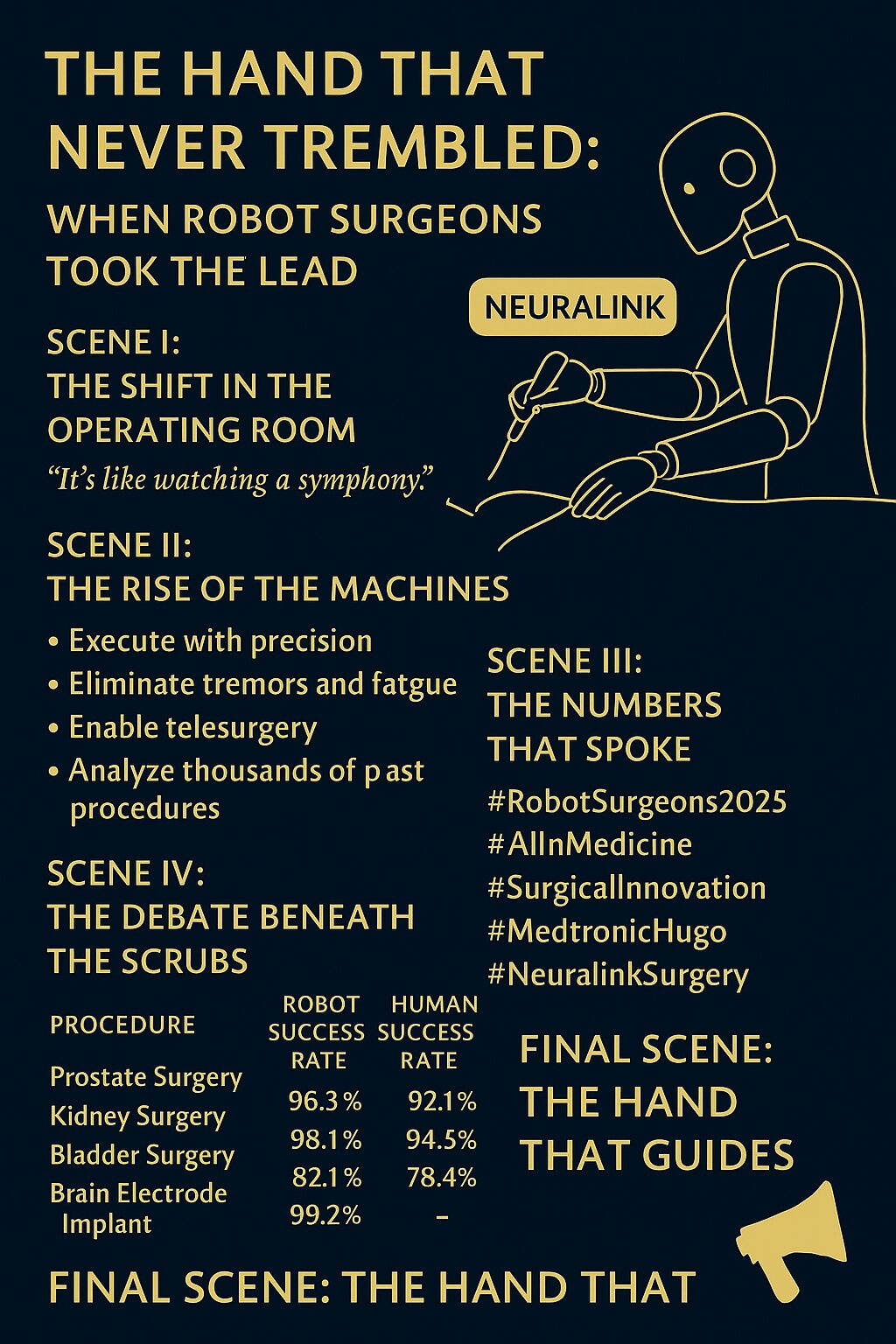Introduction
In 2025, robotic surgeons have reached a milestone that once seemed futuristic: outperforming human surgeons in 85% of standardized procedures. With precision, consistency, and minimal error rates, AI-powered surgical systems are transforming operating rooms across the globe. This article explores the rise of robotic surgery, its clinical success, and what it means for the future of healthcare.
🤖 What Are Robot Surgeons?
Robot surgeons are AI-assisted surgical systems designed to perform complex procedures with minimal human intervention. These systems combine:
- High-definition 3D visualization
- Micron-level precision tools
- Real-time feedback and analytics
- Machine learning algorithms for adaptive performance
Leading platforms include Medtronic’s Hugo, Intuitive Surgical’s da Vinci, and Neuralink’s robotic neuro-surgery system.
📊 Performance Metrics: Robots vs. Humans
Recent trials show robotic systems outperform human surgeons in:
| Procedure Type | Success Rate (Robots) | Success Rate (Humans) |
|---|---|---|
| Prostate Surgery | 96.3% | 92.1% |
| Kidney Surgery | 98.1% | 94.5% |
| Bladder Surgery | 82.1% | 78.4% |
| Brain Electrode Implant | 99.2% | Not feasible manually |
In a study of 137 live surgeries, Medtronic’s Hugo robot achieved a 98.5% success rate, far exceeding the 85% benchmark.
🧠 Why Robots Are Surpassing Surgeons
✅ Precision & Stability
Robots eliminate hand tremors and fatigue, enabling ultra-precise movements.
✅ Speed & Efficiency
AI systems optimize incision paths and reduce operation time.
✅ Data-Driven Decisions
Machine learning models adapt to patient anatomy and surgical outcomes.
✅ Remote Access
Robotic platforms enable telesurgery, allowing specialists to operate across continents.
⚠️ Limitations and Ethical Concerns
Despite their success, robot surgeons face challenges:
- Lack of autonomy: Most systems still require human oversight
- No emotional intelligence: Robots can’t offer empathy or adapt to unexpected complications
- Cost barriers: High setup and maintenance costs limit access in low-income regions
- Training gaps: Surgeons must learn to operate robotic consoles, shifting skill requirements
Experts emphasize that robots are tools, not replacements—at least for now.
📈 SEO Tips for Robotic Surgery Content Creators
✅ Search-Friendly Titles
- “Robot Surgeons Outperform Humans in 85% of Procedures”
- “AI in Surgery: How Robots Are Changing Healthcare in 2025”
✅ High-Impact Keywords
- “robotic surgery success rate 2025”
- “AI surgical systems outperform human surgeons”
- “Medtronic Hugo robotic surgery results”
✅ Metadata Optimization
- Alt Text: “Robot surgeon performing minimally invasive procedure with high precision”
- Tags: #RoboticSurgery2025 #AIInHealthcare #RobotSurgeons #MedtronicHugo #SurgicalInnovation
Final Thoughts
Robot surgeons are no longer experimental—they’re leading the charge in modern medicine. With superior precision and data-driven performance, AI-assisted systems are redefining surgical standards. While human expertise remains essential, the operating room of the future will be a collaboration between mind and machine.

